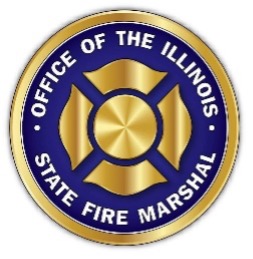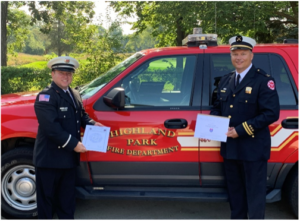

In August 2000, building on the self-assessment model for departments, the Center for Public Safety Excellence (CPSE) established the Commission on Professional Credentialing (CPC) Chief Fire Officer (CFO) designation. The designation provides a mechanism for chief fire officers to not only be recognized for their past accomplishments but also provide a roadmap for continuous improvement. As of September 2021, over 1,500 professionals hold the Chief Fire Officer designation, and over the 21 years of the program, 2467 officers have been designated as CFOs.
CFOs go through a rigorous evaluation, both initially and every three years, to obtain and maintain this designation The process looks at the “whole officer” and focuses on seven components that cover the span of an officer’s experience. All applicants, whether candidate or renewal, are reviewed by a team of peers. This review process includes an oral interview. The CPC is the conferring body.
The Illinois Fire Chiefs Association operates the Illinois Chief Fire Officer certification program. An equally rigorous process that includes educational requirements, experience, and professional development.
Throughout its history, CPSE has sought out opportunities to partner and collaborate with other fire service and local government organizations to achieve its mission of leading the fire and emergency service to excellence. As the global organization dedicated to collaboratively improving health, wellness, and safety outcomes in all communities, the opportunity to partner with Illinois was an intriguing one.
Could the Illinois certification and CPSE CFO designation come together in some way?
“In 2013, we developed the Chief Fire Officer Certification training program, a year-long, program that is equivalent to a masters-degree level,” said Jim Dominik, chief administrator for the Illinois Chief Fire Officer Certification Program and a retired fire chief. “We had a Fire Officer III program and we wanted to expand upon that.”
When establishing the program, the Illinois Fire Chiefs Association Education Research Foundation put together a commission to work on identifying the objectives that would be important to be a certified Chief Fire Officer. “We saw the need to develop leaders for the future, so we created this program with standards and objectives that culminated in a state certification,” said Dominik.
Following the successful completion of the course, the candidates’ applications and credentials are submitted to a board of their peers for evaluation where they are awarded full or provisional certification or denied. “It is very rare that someone is denied,” said Dominik, “and if they are awarded a provisional certification, they are given a very clear process to achieve full certification.”
Currently, this is a lifetime certification, but the committee is working on a recertification process. “There are approximately 60 people a year that go through the process, and this number is pretty consistent from year-to-year,” reported Dominik.
Given the similar goals of the CPSE and Illinois programs, is there a possibility of the two working together for the benefit of the professional fire officer?
“The CPSE CFO designation is the standard, nationwide, and it is a well-respected organization,” said Illinois State Fire Marshal Matt Perez. By creating a program that bridges the CPSE CFO designation with the Illinois Chief Fire Officer certification, it would clearly be for the benefit of not only the individual, but the fire service as a whole, and Marshal Perez was a part of the driving force in developing this joint effort.
“Chief Bergsten really led this charge,” said Dominik, “and it is something that we have been working on for a couple of years.” Derek Bergsten was formerly fire chief for the Rockford Fire Department in Illinois and recently took over as chief for the Poudre Fire Authority in Fort Collins, Colorado. Bergsten is very active within CPSE as a designated Chief Fire Officer (CFO), Chief EMS Officer (CEMSO), and Chief Training Officer (CTO) and is the current chair of the Commission on Professional Credentialing (CPC) where he represents Career Departments.
“The idea for a bridge program between Illinois and CPSE came up about four years ago,” said Bergsten. “I talked with Debbie Sobotka, (currently the CPSE Chief Operating Officer, but was in charge of the CPC program at the time) and Jim (Dominik) to see if we could do something reciprocal. Matt Perez (Office of the Illinois State Fire Marshal (OSFM)) facilitated getting things done, and he was a true advocate for both CPSE and Illinois.”
CPSE COO Debbie Sobotka shared “Working in collaboration with OSFM to build this bridge program seemed a natural way to provide a benefit to those that have already gone through a similar rigorous process like the CPC CFO designation”.
In recognizing the high standards provided by the OSFM, the CPSE has allowed a “bridge” program. Once an individual has completed and achieved certification as a Chief Fire Officer with the OSFM, the individual can apply for CPSE CFO using a streamlined application process. In order for graduates of the Illinois program to take advantage, they must file the application with the Commission on Professional Credentialing (CPC) within six months of graduation.
In addition, there are avenues for someone from out of state taking advantage of this certification. “If someone comes from out of state and gets employed by an Illinois department, we have course equivalency,” said Mitzie Woodson, division manager for the Division of Personnel, Standards and Education. “You have to be on a department’s roster, make a request in writing and provide credentials from the other state. In lieu of taking the course you can take a written exam and if you pass it the first time, you can become certified. If you should not pass it, you then have to complete the approved course.”
According to Bergsten, there was a lot of interest in both an Illinois certification and a CPSE designation. “If someone wanted to pursue further advancement in other states, it gave them more flexibility in that the CPSE designation is recognized across the country.”
There was also a great deal of interest within CPSE to pursue a partnership. “What was being done in Illinois resembled a lot of what we were doing at CPSE,” observed Bergsten, “and if we can create this bridge it would be a win-win for both organizations and a major step for the chief fire officer pursuing certification.”
According to Rick Mason, CFO, CPC Program Manager for CPSE, there are currently 52 CFOs that have taken advantage of the bridge program between CPSE and Illinois.
Why should someone get both?
There are a number of reasons, according to Dominik, but probably the most important one is the network that develops. “That network is so powerful and helpful. Not only do they learn so much going through the program, the officers stay connected to each other and the instructors.”
In Illinois, a chief fire officer is not required to be certified and if someone is pursuing this certification it is because they want to improve their professionalism. “The certification program in Illinois is voluntary, it is not mandated for the fire service,” said Mitzie Woodson, division manager for the Division of Personnel, Standards and Education. “If they do use it, they have to be a member of an Illinois fire department to be certified in the state.” Holding such a certification is a benefit to any fire officer that may be looking to move up or move elsewhere within the fire service in Illinois.
It isn’t an easy process, either through Illinois or CPSE, but the benefit to the officer when it comes to professional growth and continuous improvement are significant.
“Nothing worth having is easy,” said Bergsten.
More information on the Illinois Chief Fire Officer certification program can be found here and more information on the CPC Chief Fire Officer program can be found here.
CPSE is continuously reviewing our programs to determine additional opportunities for partnership, collaboration, or prima facie. If there is a program in your state or region that you feel could integrate with one of CPSE’s program, please contact us at info@cpse.org.

Deputy Chief Joe Schrage of Highland Park receives his OSFM certification and CPSE CFO designation presented by David Hoppe of Elk Grove Village
